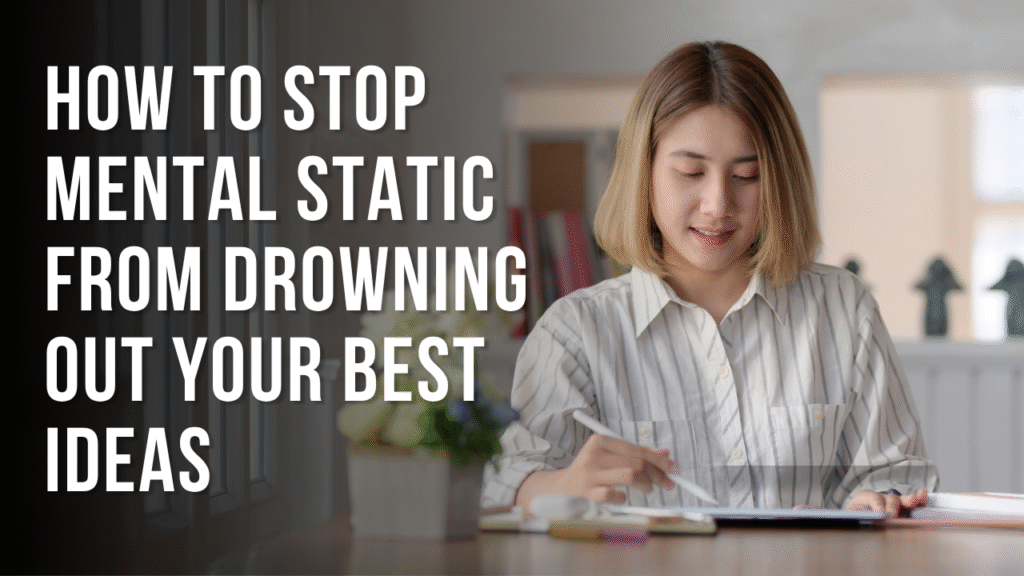Your brain’s probably carrying more than it can hold right now. Not because you’re weak or scatterbrained, but because we live in a world where everything is screaming for a piece of you — news headlines, unfinished to-do lists, old grudges, a thousand random “shoulds” hanging around like junk mail you never threw away.
And when you don’t clear it out? It piles up. The mental version of that hall closet you keep meaning to clean, where you open the door, sigh, and shove it shut before anything falls out.
You can function like that… for a while. But eventually, you stop thinking clearly. Your reactions get shorter, your patience thinner. Every little thing feels heavier than it should, because you’re dragging around stuff that doesn’t even belong in your head anymore.
So here’s the thing — you need to detox your mind. Not in some magical “erase all your problems in 24 hours” way, but in the way you’d actually clean out a room you still want to use. You don’t just throw away everything. You sort. You decide. You make space.
Step One: Identify What’s Actually Junk
Most people never even slow down enough to notice what’s clogging their mental space. It’s just background noise. But try this — the next time you’re feeling heavy or irritable for “no reason,” stop and ask:
- What’s running in the background of my thoughts right now?
- Is this even mine to carry?
- Has this been sitting here for weeks, months… maybe years?
You might find old arguments you’ve replayed so many times you could recite them like a script. Or expectations you’ve carried because someone, somewhere, implied that “people like you” should. Or pointless information you keep scrolling through because you’re afraid of missing something… even though nothing you’ve read in the last week has actually helped you live better.
Some of it’s just outdated. Like expired food in the fridge. Looks fine at a glance, but if you actually tried to use it, you’d regret it.
Step Two: Quit Feeding the Mental Clutter
If you keep letting in the same junk, it doesn’t matter how many times you try to “clear your mind.” You’ll just fill it up again.
That means taking a hard look at your inputs — news, social feeds, conversations, entertainment. It’s not about living in a bubble. It’s about asking, “Does this actually add anything to my life… or is it just noise?”
I know, there’s a part of you that thinks, But I like to stay informed. Fair. But staying informed and being constantly bombarded aren’t the same thing. You can catch the highlights without marinating in a constant stream of outrage, celebrity drama, and “breaking” updates that don’t change your day at all.
And the people you talk to? Same rule. If you leave a conversation feeling heavier, tenser, or smaller, you’ve just let someone else dump their mental clutter straight into your space. You don’t have to accept every delivery.
Step Three: Create a Mental “Trash Day”
Your brain needs a reset point. A time when you deliberately go through the backlog and decide what stays and what goes.
Some people journal. Some pray. Some walk in silence. Doesn’t matter how you do it — the point is to get things out of the swirl in your head and into a place where you can actually see them.
Ask:
- Is this thought true?
- Is it useful right now?
- Is it something I can do something about today?
If the answer’s no… it goes in the trash. And yes, that includes obsessing over what someone might be thinking about you. You don’t own their head, so stop renting space in yours for it.
Step Four: Replace Clutter with Clarity
Here’s the part people skip — they clear out the junk, but don’t replace it with anything solid. And then, just like an empty shelf in the kitchen, it fills up again with whatever’s lying around.
So after you throw out the mental junk, you decide what gets to move in. That could be:
- A verse or phrase that actually centers you.
- A short list of what matters most this week.
- One problem you are going to tackle today instead of twenty you’ll never finish.
Think of it like curating a space. Not just emptying it.
Step Five: Accept That It’s Ongoing
You don’t detox your mind once and declare it “fixed.” Life keeps throwing stuff at you. People will still talk, news will still break, work will still pile up.
But if you build the habit of checking in, clearing out, and protecting your mental space, you’ll stop living like someone dragging a hundred invisible grocery bags everywhere.
And yes — it will feel strange at first. The silence. The lighter load. If you’re used to constant noise, peace feels uncomfortable. But give it time. Peace is where you can actually think. Decide. Hear yourself again.
Here’s the takeaway — mental detox isn’t about escaping life. It’s about clearing enough room in your head so you can actually live it. Not react to it. Not drown in it. Live it.
And if you start today, you might be surprised at how much of what you’ve been carrying… you never needed in the first place.



